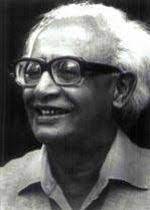 |
Home Publications Lectures News Clippings Tributes |
|
Prof Srinivas introduced research in Sociology and Social Anthropology to NIAS, and believed that the institute should undertake sociological research that encompassed inter disciplinary activities, thereby underscoring one of the tenets of NIAS - to further inter-disciplinary understanding and action. During his tenure, he was Chair of the Library Committee, and instrumental in policy making for the then fledgling Institute. Prof. Srinivas was a beloved figure at NIAS, and was known for his simplicity of speech and manner, as well as his tremendous dedication to any activity, writing, or lecture. With a ready wit, and a willingness to engage in conversation on any number of topics - for his interests varied from food and malt whiskey to cricket, pipes, detective novels, and art - Prof. Srinivas was an espouser and champion of ideas and new ways of thinking and doing. Weeks before his death, Prof. Srinivas spoke at NIAS on “Obituary on Caste as a System”, setting out his view that the old economic and social relationships that were characteristic of the caste system had broken down, but that caste had survived as a means of securing access to resources of different kinds. He was an integral part of NIAS until his death in November 1999, and his work and legacy live on. Fellow of the British Academy, Honorary Fellow of the Royal Anthropological Institute, Foreign Honorary Member of the American Academy of Arts and Sciences. Padma Bhushan, the T N Huxley Memorial Medal of the Royal Anthropological Institute in 1976, the Kannada Rajyothsava Award in 1996, and the M.V. Pylee Award for being the “Distinguished Academician of India for the year 1996” given by the Cochin University of Science and Technology |
|













